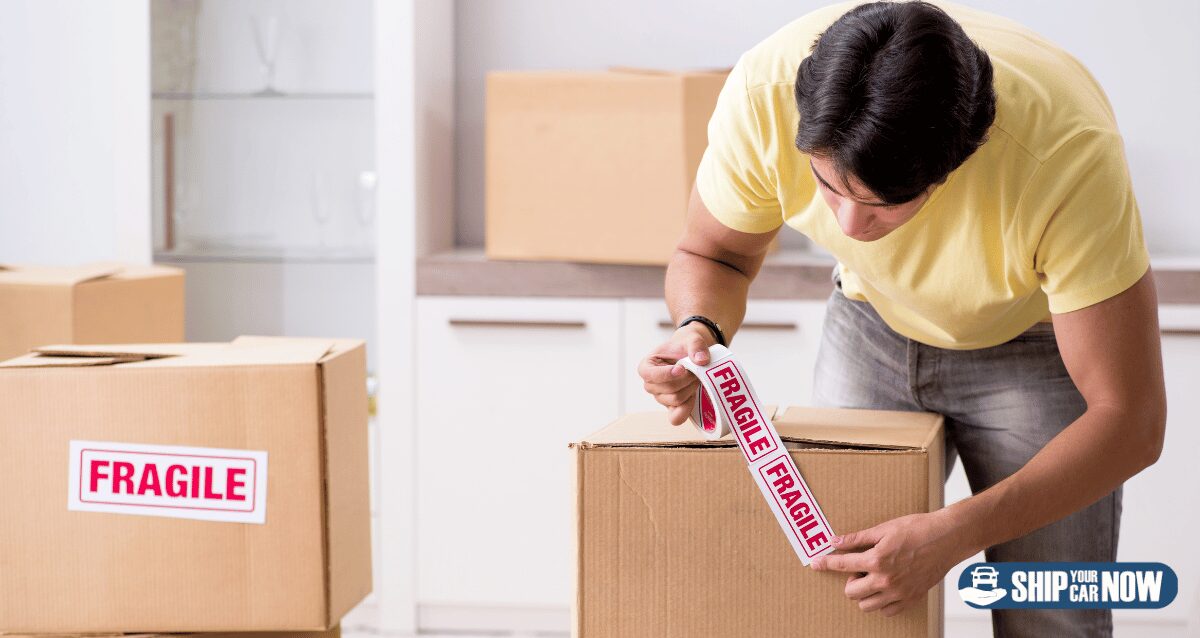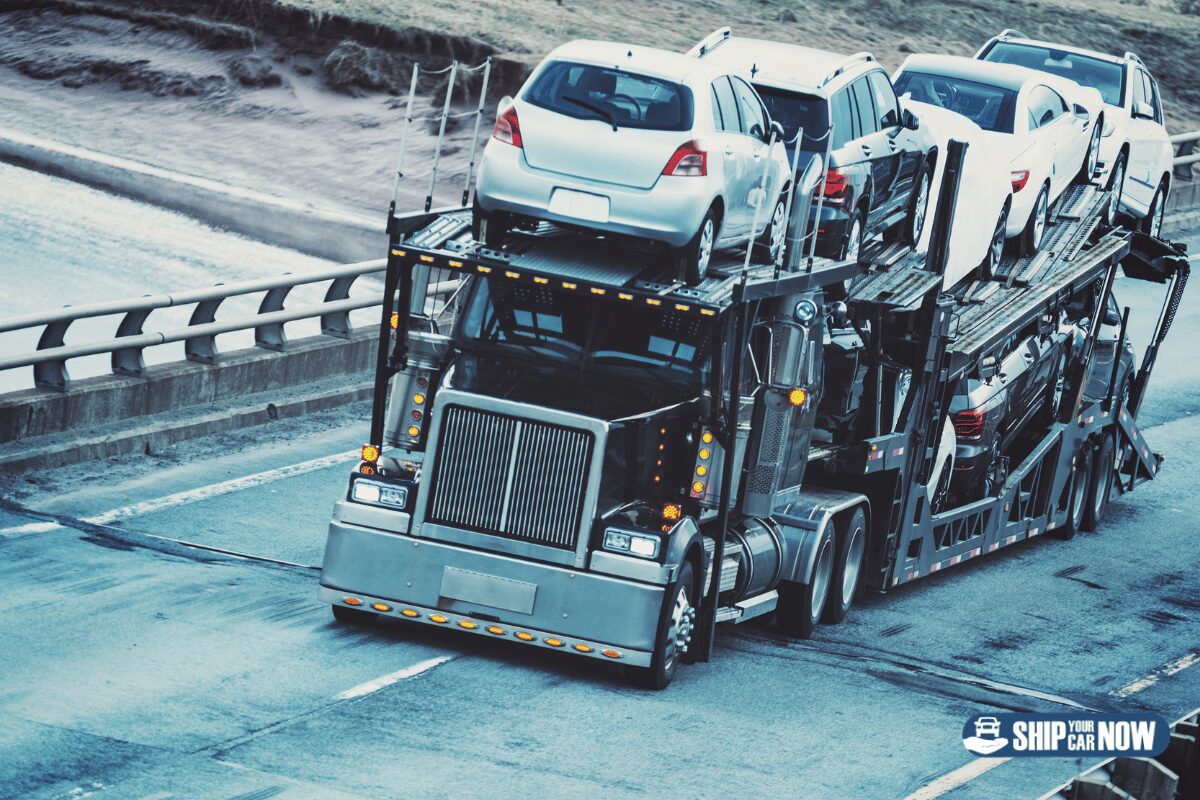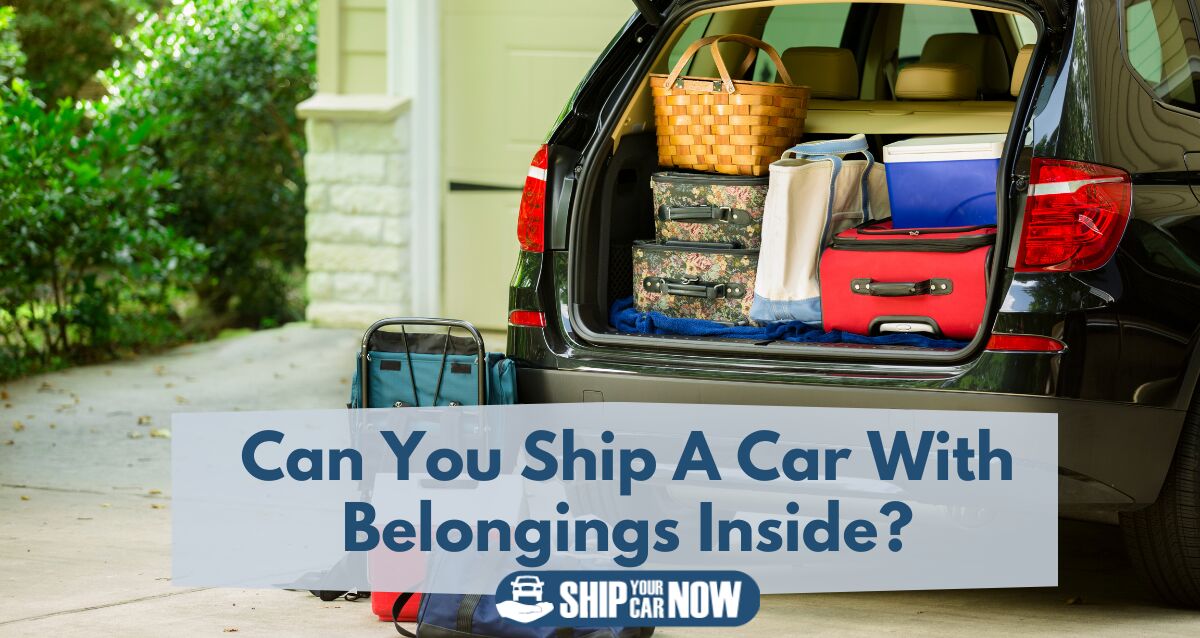If you’re wondering, “Can you put stuff in the car when shipping?” the quick answer is yes, with limitations. Auto transport companies have varied policies, and while some personal belongings are typically allowed, understanding the restrictions and preparation required is essential. Buckle up because it’s time to go through the preparations, legalities, company-specific rules, packing strategies, and insurance considerations you need to know before loading your car for shipping.
Key Takeaways
- Car shipping policies and requirements for personal items vary by company, and these belongings are not covered by the carrier’s insurance; DOT has no specific rules on this matter, and items like firearms and hazardous materials are strictly prohibited.
- Preparation steps include washing the vehicle, documenting pre-existing damage, securing belongings in the interior, and adhering to company-specific regulations on weight limits to avoid additional fees or shipping refusal.
- When shipping personal belongings, consider the limits and risks; the carrier’s cargo insurance doesn’t cover these items, and it’s crucial to evaluate additional services or alternatives for greater protection or convenience.
Understanding Car Shipping Policies for Personal Belongings
 Whether it’s a beloved collection of books, cherished family photos, or essential home appliances, you may be tempted to fill your vehicle with personal items during the car shipping process. However, bear in mind that car shipping policies for personal belongings vary among auto transport companies. While it’s generally permissible to ship personal items inside a car, companies have their individual preferences and stipulations regarding this practice.
Whether it’s a beloved collection of books, cherished family photos, or essential home appliances, you may be tempted to fill your vehicle with personal items during the car shipping process. However, bear in mind that car shipping policies for personal belongings vary among auto transport companies. While it’s generally permissible to ship personal items inside a car, companies have their individual preferences and stipulations regarding this practice.
Interestingly, the Department of Transportation (DOT) has not issued specific rules regarding the shipping of personal items inside vehicles. Instead, it relies on the policies of individual auto transport companies. So, if a car shipping company prohibits personal belongings, it is required to clean the car thoroughly, including the trunk, removing any such items.
The Legalities of Shipping Personal Items Inside Your Vehicle
While the DOT has not explicitly prohibited car shipping companies from transporting personal or household items in a vehicle being transported, there are some limitations on what can be included. Auto transporters are legally required to have liability insurance, which covers damage to cars while being transported, but this does not cover personal items inside the car.
Certain items are strictly prohibited from shipping within the vehicle. These include:
- Firearms
- Ammunition
- Flammable/hazardous materials
- Illegal substances
Thus, despite the absence of specific DOT regulations prohibiting personal items inside a vehicle during the car shipping process, understanding the legal considerations and restrictions is crucial.
Company-Specific Regulations and Weight Limitations
While legalities are one aspect, company-specific regulations are another critical factor. Carriers usually allow up to 100 pounds of additional weight free of charge for personal items. However, this weight limit can vary, and exceeding it may result in additional costs or hefty fines. Hence, it’s vital to maintain clear communication with the auto transporter to comprehend their specific regulations on shipping personal items and any potential additional charges for excess weight.
Failing to adhere to the car carrier’s weight limitations can lead to the refusal of the vehicle for transport or additional fees. To mitigate shipping costs, ensure that the car’s gas tank is less than a quarter full as part of vehicle preparation. If you’re shipping to Alaska, for instance, it’s mandatory to provide weight slips for personal items, with specific charges, such as $95 per 100 pounds of additional belongings. Car carriers face strict weight limits to avoid fines. Noncompliance with these limits may increase the shipping cost for the customer. However, premium auto transport services might permit shipping of personal belongings beyond the standard 100-pound limit, with prior arrangements regarding the weight and associated costs.
Preparing to Ship Your Car with Personal Items

Once you understand the shipping policies and legalities, the next step is preparing your vehicle and personal items for the journey. This is not just a question of packing everything in and closing the doors. Instead, several crucial steps should be followed to guarantee a smooth car shipping process.
Start by washing the exterior of your vehicle. This will make any pre-existing damage easily identifiable. Document these damages with quality, dated photographs from various angles, including capturing the odometer reading to verify the vehicle is not driven during transport. Next, clean the interior of your vehicle, removing items such as cables, chargers, spare change, and air fresheners that could move around and cause damage. You should also ensure the vehicle’s radiator has antifreeze, the battery is charged and secure, the tires are properly inflated, and any fluid leaks or mechanical problems are addressed to prevent transport-related damages.
Selecting What to Pack in Your Vehicle
Having prepared your vehicle, you’re ready to start packing. But what should you pack in your vehicle for shipping? When selecting items, consider the sentimental or monetary value and the difficulty of replacing them if they are lost, damaged, or stolen during transport.
Avoid shipping high-dollar items and any belongings visible from the car windows, as these increase the risk of theft and may not be covered by insurance. Prioritize essential personal items and high-value objects by decluttering your belongings before you ship personal belongings, reducing the risks associated with transporting unnecessary or overly bulky items.
Packing and Securing Your Belongings for Transit
Not only is what you pack important, but also the manner in which you pack carries equal significance. To minimize the risk of theft and ensure the driver’s visibility, personal belongings should be kept below the window line when packing a vehicle for shipping.
Items should be secured in suitcases, duffle bags, or sturdy boxes and not left loose inside the car to prevent them from moving around during transportation. Personal items must be arranged and properly packed to ensure they do not shift during the trip, avoiding potential damage to the car’s interior. Remember, damages that could occur from unsecured personal belongings inside are not included in the carrier’s cargo insurance coverage.
Final Pre-shipment Checklist
 Once the vehicle and belongings are packed and safely secured somewhere, the next action is to go through a pre-shipment checklist. This includes:
Once the vehicle and belongings are packed and safely secured somewhere, the next action is to go through a pre-shipment checklist. This includes:
- Confirming that the tires are properly inflated
- Checking that the emergency brake is functional
- Topping off all vehicle fluids
- Resolving any mechanical issues to prevent problems with starting or operating the car during transport.
To prepare your car for transport, follow these steps:
- Create a thorough inventory of personal items in the car and use photographs or videos to document the current state of both the car and the items inside.
- Prepare a spare key for the transport driver.
- Leave the tank around a quarter full to aid in moving the vehicle when necessary.
By following these steps, you can ensure that your car is ready for transport.
Risks and Insurance Considerations When Shipping Stuff in Your Car
 Shipping personal items in a car comes with its fair share of risks. The carrier’s cargo insurance does not extend coverage to personal items transported within the vehicle, leaving the owner responsible for any losses or damages at their own risk. Shipments are at risk of damage or loss of personal belongings through theft or shifting during transit, which is not covered by the carrier’s cargo insurance.
Shipping personal items in a car comes with its fair share of risks. The carrier’s cargo insurance does not extend coverage to personal items transported within the vehicle, leaving the owner responsible for any losses or damages at their own risk. Shipments are at risk of damage or loss of personal belongings through theft or shifting during transit, which is not covered by the carrier’s cargo insurance.
Damages to a car’s interior or the car’s mechanical issues caused by items packed within are not covered by the shipper’s insurance, leading to potential added costs for the vehicle owner. Therefore, it’s of utmost importance to weigh the convenience against the risk of shipping personal belongings in the vehicle and to comprehend the limitations of insurance coverage.
Understanding Carrier’s Cargo Insurance vs. Own Auto Insurance Coverage
While carrier cargo insurance covers damage to cars while being transported, it does not cover personal items inside the car. It’s essential to ask for written proof of the auto transporter’s insurance coverage and to confirm with the insurance company or the Department of Transportation.
Being a vehicle owner, it’s your responsibility to maintain active insurance coverage for your vehicle during transport. This insurance should encompass potential damages not accounted for in the carrier’s cargo insurance, like ‘Acts of God’. As auto insurance policies differ, owners are advised to confer with their insurance agents to grasp the coverage extent, potentially including the requirement for supplemental insurance for comprehensive protection during car shipping.
Mitigating Risks: Theft, Damage, and Loss
 Considering the risks and insurance limitations, what steps can be taken to mitigate potential issues? Firstly, use common sense when packing and avoid shipping high-value or irreplaceable items that can attract potential thieves. Securing items below window lines and inside locked trunks can minimize visibility and help prevent theft of belongings during car shipping.
Considering the risks and insurance limitations, what steps can be taken to mitigate potential issues? Firstly, use common sense when packing and avoid shipping high-value or irreplaceable items that can attract potential thieves. Securing items below window lines and inside locked trunks can minimize visibility and help prevent theft of belongings during car shipping.
Be aware that stops at rest areas, parking lots, and fuel stations pose a higher risk for burglary, especially for vehicles visibly packed with personal items. An effective way to safeguard against theft is by using enclosed auto transport, which renders personal items less visible and accessible to potential thieves. Not only does enclosed transport protect personal belongings, but it also prevents potential damage to the vehicle itself, particularly if it’s loaded with valuable items.
Additional Services: Enclosed Auto Transport and Premium Options

While standard car shipping options are suitable for most situations, you might want to consider additional services for enhanced safety and convenience. Enclosed auto transport, for instance, provides additional protection for both your vehicle and any personal belongings you may ship with it during the car shipment process.
Benefits of Enclosed Auto Transport for Personal Belongings
 Enclosed auto transport offers superior protection from weather conditions, which is especially important for shipping valuable and sensitive personal belongings. It also shields personal belongings from road debris, ensuring a clean and safe environment during transit.
Enclosed auto transport offers superior protection from weather conditions, which is especially important for shipping valuable and sensitive personal belongings. It also shields personal belongings from road debris, ensuring a clean and safe environment during transit.
Fragile items are safer when shipped in enclosed auto transport due to the reduced risk of shifting and potential breakage. Enclosed transport also protects personal belongings and prevents potential damage to the vehicle itself.
Paying Extra for Added Convenience and Security
 While enclosed auto transport offers enhanced security, there are other premium options available for added convenience. Including personal belongings in your vehicle during shipment can save space in the moving truck, keep items safely intact, and prevent them from being rattled around or loaded on and off multiple trucks.
While enclosed auto transport offers enhanced security, there are other premium options available for added convenience. Including personal belongings in your vehicle during shipment can save space in the moving truck, keep items safely intact, and prevent them from being rattled around or loaded on and off multiple trucks.
Nonetheless, these additional conveniences carry a price. Full-service moving companies, an alternative to putting belongings in a vehicle, typically range from $25 to $50 per hour per mover, with the total cost varying based on the amount of items, distance of the move, and the time of year [1]. Therefore, you need to weigh the costs and benefits before deciding to pay extra for added convenience and security.
Alternatives to Shipping Personal Items in Your Car

If you still harbor uncertainties about shipping personal items in your car, there’s no need to worry. There are alternatives available that might better suit your needs. This includes options like professional moving services and parcel shipping services, each carrying its unique benefits and drawbacks.
Options like CitizenShipper, an online peer-to-peer shipping marketplace, offer value and security through background-checked transporters and a booking assurance guarantee, allowing direct driver contact. Classified ads on platforms like Craigslist or Facebook Marketplace can be a flexible and affordable alternative for shipping, though they come with less security and the potential use of non-professional drivers for transportation.
Other international delivery services like FedEx and UPS also provide reliable tracking but have restrictions on specific items that they will not transport. You could also consider renting from U-Haul, which gives complete control over the moving process and can be economical, but it demands a substantial time investment and increases personal liability.
Using Professional Moving Services for Household Goods
Professional moving services are an effective solution for shipping household goods, facilitating the transport of large and bulky items that auto transport companies cannot accommodate. Full-service movers offer comprehensive solutions, including:
- All necessary packing materials
- Expert packing services
- Furniture disassembly and reassembly
- Handling the truck loading and unloading
Employing full-service moving companies can greatly simplify the moving process, drastically minimizing the time and effort demanded from homeowners. However, it’s recommended to request estimates from at least three different moving companies to ensure competitive pricing and service options that best fit individual moving needs [2].
Parcel Shipping Services for Smaller Valuables
For smaller, precious items that necessitate secure and insured transit, parcel shipping services serve as an advisable solution. Services from FedEx and UPS, for instance, are particularly suited for fragile and high-value items like artwork or electronics, as well as larger or unconventional items like golf clubs or sports equipment.
The UPS Store offers a Pack & Ship Guarantee, which ensures items are covered in case of damage or loss during transit when packed and shipped through their service. Under the Pack & Ship Guarantee, customers can receive reimbursement for the value of the item, the full retail price of the packaging materials and services, and shipping costs, with certain exceptions such as declared value charges or insurance costs [3].
ShipYourCarNow: Hassle-Free Car Shipping with Industry-Leading Services
If a hassle-free car shipping experience is what you seek, take ShipYourCarNow into consideration. As one of the industry leaders in vehicle transport, we provide:
- Reliable, affordable car transport services
- Door-to-door shipping
- Claim assistance
- Expert logistics support
Whether you’re shipping a car coast-to-coast (domestic US) or internationally, ShipYourCarNow has got you covered.
Full Summary
Shipping your car with personal belongings is a nuanced process that requires careful consideration of various factors, including shipping policies, legalities, preparation steps, and insurance coverage. We’ve explored how to mitigate risks, the value of additional services like enclosed auto transport, and alternatives for shipping personal items. Whether you choose to include personal items in your vehicle or opt for a different solution, the key is to make an informed decision that offers peace of mind and ensures a smooth transition to your new destination.
Frequently Asked Questions
Can you put luggage in a car being transported?
Yes, you can put luggage in a car being transported by a car shipping company, but they typically have a weight limit of up to 100 pounds for personal items and are not responsible for any loss or damage.
How do you pack a car for shipping?
When packing your car for shipping, avoid shipping valuables, ensure items are not visible from windows, and check weight limits. Also, remove personal items, perform maintenance, empty the gas tank, and lock the car before shipping.
Are there any legal restrictions on what I can ship in my car?
You are generally allowed to ship personal items in your car during the shipping process, but firearms, ammunition, flammable/hazardous materials, and illegal substances are strictly prohibited. It’s important to double-check the restrictions to ensure compliance.
What are the benefits of using enclosed auto transport?
The benefits of using enclosed auto transport include superior protection from weather conditions and road debris, as well as reduced risk of theft due to shielding personal belongings from visibility.
What alternatives are there to shipping personal items in my car?
Consider using professional moving services for household goods or parcel shipping services for smaller, valuable items. Services like CitizenShipper, FedEx, UPS, or renting from U-Haul are viable alternatives to shipping personal items in your car.








Senior automotive logistics professional with a passion for the industry and a 10+ year history of accomplishments. Proven track record of exemplary client management working with both RMCs, Van Lines and OEMs. Keen ability to react to an ever-changing marketplace while offering superior technology solutions, programs and services. Architect of award winning auto transport portal technology offering transparency and agility to clients, agents and transferees. Successful team builder and leader easily managing budgets with effective leadership, strategic planning, and problem-solving capabilities.